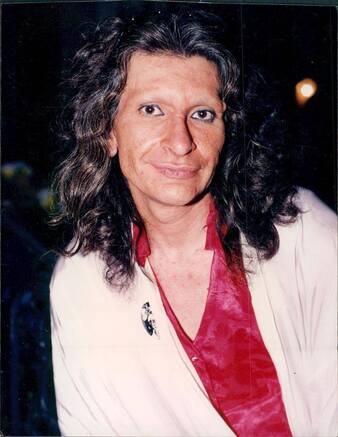Sylvia Rivera was born on July 2, 1951, in New York, and was a major Latino trans activist who fought alongside Marsha P. Johnson for gay liberation and transgender rights.
Rivera was born and raised in New York City and lived most of her life in or near the city. She was born to a Venezuelan mother and Puerto Rican father, José Rivera, who abandoned them early in her life. Sylvia was orphaned after her mother committed suicide when she was just three years old and was then raised by her Venezuelan grandmother, who disapproved of her fascination with make-up and female clothing. That's why she was constantly beaten, which led her to run away from home at just 11 years old, in 1962, when she was forced to work as a child prostitute. She was taken in by the local drag queen community who gave her the name Sylvia. However, her life went through an important moment when she met Marsha P. Johnson in 1963.
As recalled by
Vogue Magazine, Johnson was seen by Rivera as a mother and she saw her friend as a kind of hero. Together, they became centerpieces in the fight for LGBTQIA+ causes, ahead of the Stonewall Uprising.
Rivera's activism began in 1970 after she participated in actions with the Gay Liberation Front’s Drag Queen Caucus and later joined the Gay Activists Alliance at 18 years old, where she fought for not only the rights of gay people but also for the inclusion of drag queens like herself in the movement.
Rivera and Johnson became key figures in the events that followed the police raid on the Greenwich Village gay bar the Stonewall Inn on 28 June 1969. Having resisted arrest, Rivera and others led a series of uprisings in protest at the raid. “Before gay rights, before the Stonewall, I was involved in the Black Liberation movement, the peace movement”, Rivera said in an interview in 1989. “I felt I had the time and I knew that I had to do something. My revolutionary blood was going back then. I was involved with that”.
The first gay Pride parades followed in 1970, but though the gay rights movement was starting to flourish, some people didn’t want transgender people to be a part of it. In 1973, Rivera joined in with the annual Pride march, but was forbidden from speaking at it. Rivera didn’t let it stop her. After grabbing the microphone, she told the crowd: “If it wasn’t for the drag queen, there would be no gay liberation movement. We’re the front-liners”, She was booed off the stage, and later attempted suicide, but was found by Johnson, who brought her to hospital. Not long afterwards, Rivera left New York – and activism – behind.
Like Johnson, Rivera, who was 50 when she died from liver cancer in 2002, had her own drag persona and was part of the drag group Hot Peaches. In 1975, her efforts were immortalized in Warhol’s 1975 polaroids portfolio, named Ladies and Gentlemen. Warhol shot screen-prints of drag queens and the transgender community at the Gilded Grape nightclub for the series. Johnson and Rivera also together founded STAR (Street Transvestite Action Revolutionaries), to support young transgender people. “Marsha and I fought for the liberation of our people”, a tearful Rivera said during in a 1989 interview. “We did a lot back then. We did sleep in the streets. Marsha and I had a building on 2nd Street, which we called STAR House. When we asked the community to help us, there was nobody to help us. We were nothing. We were nothing!”
In the 1980s, AIDS devastated the gay and transgender community. Johnson herself was diagnosed with HIV in 1990, and her death in 1992 (aged 46) went largely unreported by the mainstream press. Johnson’s body was found in the Hudson River, and her death was declared a suicide, but her friends and fellow activists always had their doubts about the ruling. It wasn’t until after her friend’s death that Rivera moved back to New York permanently. By 2001, she was once again marching in Pride parades, and living in Transy House, a New York collective that provided self-shelter for transgender and gender non-conforming people in need.
Today, decades after Rivera started fighting for LGBTQIA+ rights, recognition is finally growing for her invaluable contributions to social justice.
In June 2019, the Italian city of Livorno dedicated a green area to Rivera, called Parco Sylvia Rivera. In June of that same year, Rivera was one of the inaugural fifty American “pioneers, trailblazers, and heroes” inducted on the National LGBTQ Wall of Honor within the Stonewall National Monument (SNM) in New York City’s Stonewall Inn. The SNM is the first U.S. national monument dedicated to LGBTQ rights and history, and the wall's unveiling was timed to take place during the 50th anniversary of the Stonewall riots.
 digitaltransgenderarchive.net
digitaltransgenderarchive.net











